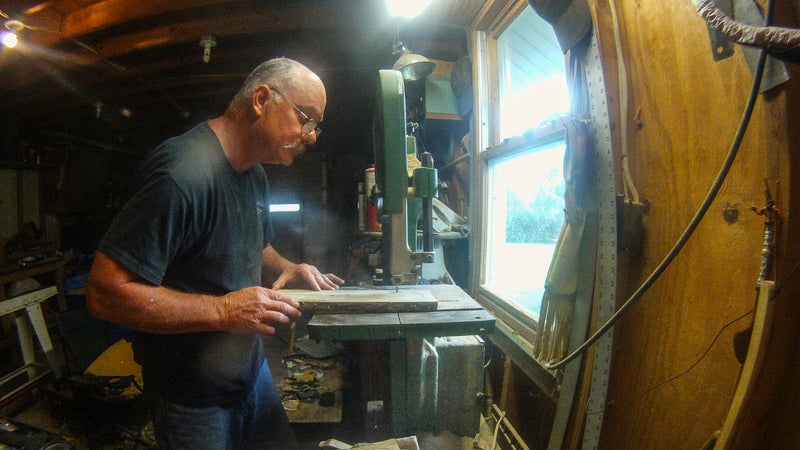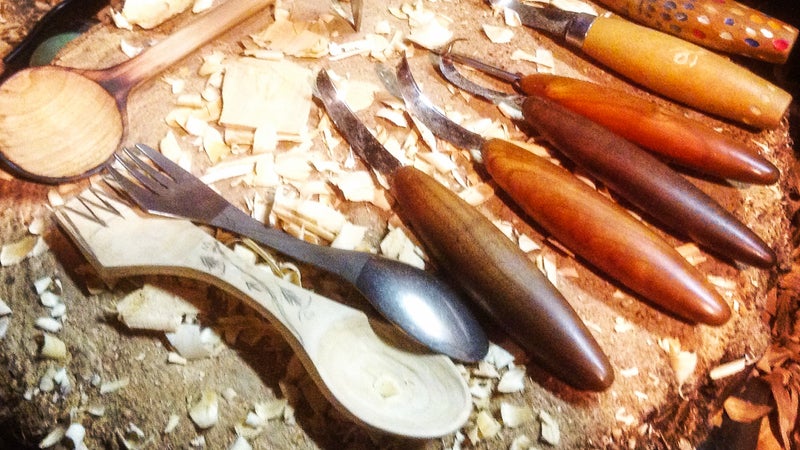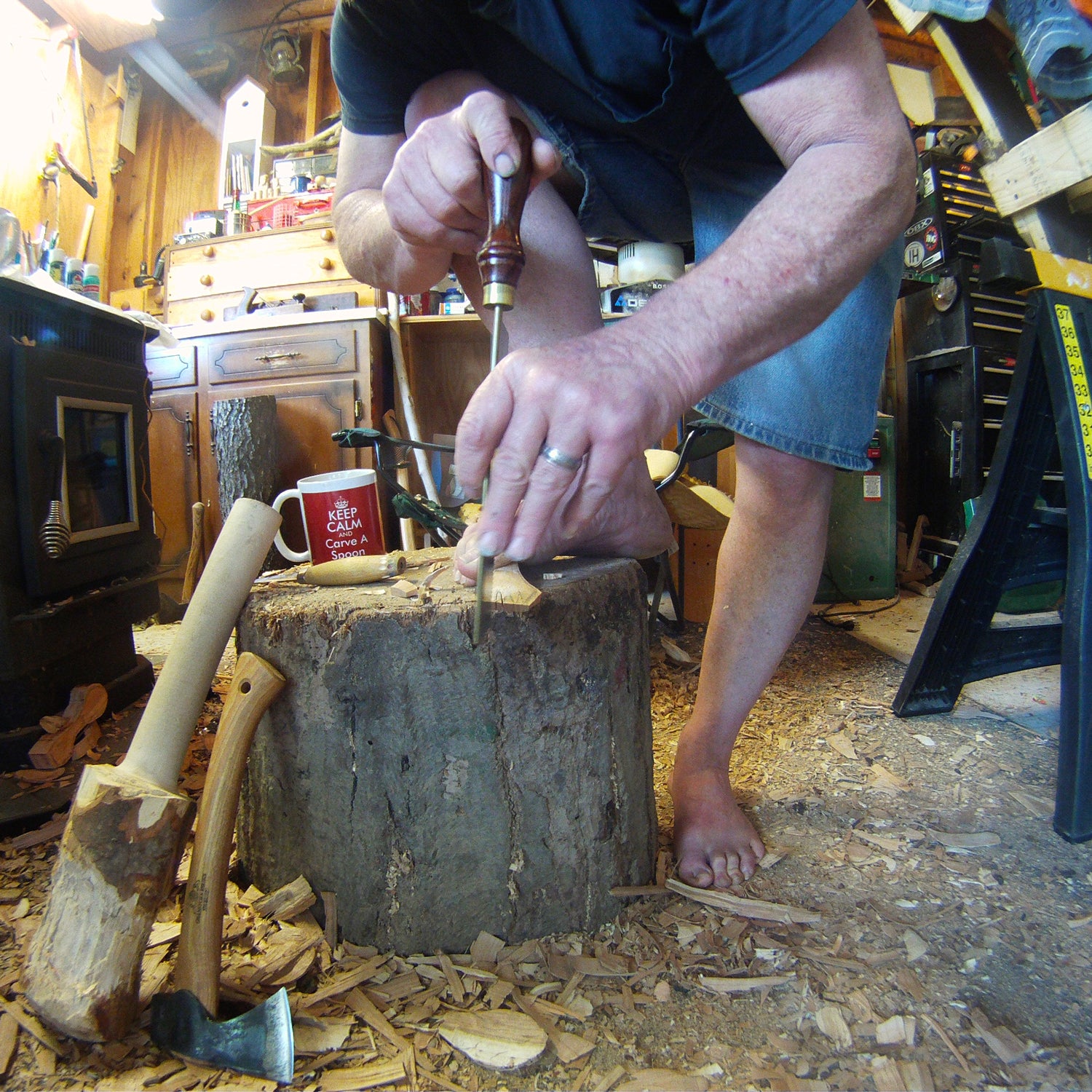On a gloomy morning in early April, Jim Tabor parked his blue pickup truck in a lot off Highway 16 in southern Pennsylvania, then hiked north through along the Appalachian Trail. His morning shift at the nearby rock quarry started in an hour, so he wasted no time. A few hundred yards into the woods, he pulled from his pocket a hand-carved spoon whittled from a block of cherry wood that he made the week before. He slipped it into a Ziploc bag, along with a Snickers bar and a card with his email address, then draped the bag on a nearby log—just visible to any passersby. Mission accomplished, he backtracked to his truck and drove to work.
With any luck, Tabor will hear from a hiker that stumbles across the cache. Regardless, in a few days he’ll be back to stash a new spoon or two. “I just want to know where the spoons go and who gets them,” Tabor says.
Tabor has been leaving spoons for hikers on the AT since 2011, when he dangled one from a leafy branch near the trail, not too far from his home in Mont Alto, Pennsylvania. The first one was simple and unpainted, the nicks from his knife evident and scattered across the slim handle down to the oval bowl. “I left that spoon and never heard from it again,” Tabor says with a laugh.

For more than a year, he stashed spoons along the trail without hearing from anyone. Then, during the next spring through-hiking season, messages began trickling in from gracious hikers. The more time Tabor spent hiking that summer, he began meeting people who, to his surprise, knew of his spoons. “It kind of spread by word of mouth on the trail and took off,” he says. “People would . They started to know to look for the spoons once they got to Pennsylvania.” Since then, he’s continued his ritual every year.
Dropping wooden spoons on the country’s most high-profile wilderness trail seems a bit quirky. But for the AT, it's business as usual. The footpath is riddled with hundreds of trail angels providing acts of kindness for the thousands of through-hikers who traverse it each year. What sets Tabor apart is that each of his spoons is a unique work of art that takes him hours to produce. For hikers, the rare gift is a morale booster, a keepsake, and a practical tool. But most of all, it's a physical representation of the . After all, Tabor doesn't ask for money or even seek recognition for what he does—his goal is to brighten a hiker's day.
Folks in the through-hiking community call him Spoon Man or the Barefoot Carver, because he occasionally hikes or carves without shoes. Most days, he crisscrosses a roughly three-mile segment of trail near his home, where he maintains a pair of lean-to trail shelters. In addition to handing out spoons, he also removes blowdowns from the trail, picks up trash, and doles out ice cream sandwiches to hungry hikers. Occasionally, he’ll cover ground in Maryland or upstate Pennsylvania. He estimates he’s given away 200 spoons in the six years since he started. This season, he’ll give away 50 to 60 more.
“You can’t carry home the sign from with you, but this spoon has become a symbol of my hike,” says 2015 through-hiker Robert Capo. He found a spoon on a log beside the trail one morning. He toted it with him for the duration of his hike, 1,000 miles from southern Pennsylvania to Maine. While he occasionally used it to eat with, he cherishes it more as a memento, a tangible reminder of his life-changing journey.
Tabor isn’t sure what to make of his nearly . The 57-year-old has worked as a maintenance mechanic for 24 years at a mining supply company. He’s a quiet family man with four children and a wife of 34 years. He’s naturally reserved and humble, passing off his extracurricular spoon gestures like they’re no big deal. “I’m not doing it other than for the pure enjoyment and seeing people happy,” he says. “When I see the smiles on people’s faces, that makes me happy.”

Tabor has always had a natural gift for working with his hands. In high school, he started working with wood, making bowls and furniture. “For as long as I can remember he has been consumed by hobbies,” says Tabor’s younger brother, Tom. “He gets almost like obsessed with things and it’s all he can think about.” Over the years, that's extended to photography, model trains and HAM radios.
Tabor started carving spoons in 2009 when Tom introduced him to the craft through YouTube. “He made new designs and tried to figure out faster ways to make a spoon,” Tom says. Not long after, Tabor started taking day hikes along the Appalachian Trail to lose some weight. One day the idea clicked, and he left that first spoon in the tree.
“I’m not doing it other than for the pure enjoyment and seeing people happy.”
The spoon Tabor gives to hikers is based off a design he’s perfected over the years, what he calls a trail spoon, and can usually produce in just under two hours. He also makes sporks and spoons with elongated handles for eating from freeze-dried food pouches. He works with maple, birch, or cherry wood, the latter the most attractive timber due to its straight grain and amber tint. He starts with a chainsaw to shorten logs, then splits and refines them with an axe. Carving knives make more precise cuts to shape the block of wood, and a hook knife digs the bowl. He soaks the spoons in food-safe mineral oil for a few days, and the final touch is leaving them to dry, although he may paint the handle and drill a hole in it to hang a loop of raw hide.
“It’s a basic, simple wooden spoon but carries a lot more meaning to it because someone took the time to make it,” says Michael Begansky, who met Tabor on the trail while through-hiking in 2013. “For a hiker using it and carrying it with them, it can be a pick-me-up if you’re having a bad day. It’s like you’re connected with Jim through the spoon.”
In May 2013, Lerin O’Connell had just started a weeklong section hike along the AT in Pennsylvania when she encountered Tabor, who was picking up trash near one of his shelters. O’Connell relayed her hiking plans, while Tabor discussed his now-deceased father, who at the time was ill with frontotemporal degeneration corticobasal syndrome, a rare neurological disease. Although Tabor didn’t have a spoon to give to O’Connell, he promised to mail her one. Tabor took off down the trail, and O’Connell settled in for the night.
The two stayed in touch, trading messages on Facebook about O’Connell’s hike. One day Tabor received a note from O’Connell, letting him know that her father, Dan, had been diagnosed with pancreatic cancer. “We started messaging back and forth to support each other through our dad’s illnesses,” she says.
When Dan began treatments of chemotherapy, he struggled to eat. Utensils left a metallic taste in his mouth that he could hardly tolerate. “The doctor recommended he could use a wooden spoon,” O’Connell says. “I knew if I asked Jim, he would make one for me.”
“It’s a basic, simple wooden spoon but carries a lot more meaning.”
Tabor didn’t waste any time. Within the week, he had mailed O’Connell a spoon with a purple handle—. It helped O’Connell’s father stomach the otherwise nauseating tastes for months until he passed away in July 2014. Tabor continued crafting the purple spoons as a way to honor Dan, handing out dozens to hikers over the years. Today, if O’Connell is on his mind, he’ll whittle a purple spoon.
“One of the things my dad was afraid of when he was dying was that people would forget about him,” O’Connell says. “All of these people have purple spoons in remembrance of my dad, so he’s not being forgotten.” O’Connell describes Tabor as altruistic and uplifting, apparent even after their one, brief meeting. “He’s just somebody who would really do anything for anybody, so long as he didn’t get recognition for it.”
It's the human connections Tabor cares most about. His spoons are simply a vehicle that allows him to step into the lives of a few of the millions who hike the AT every year. When asked if he’ll through-hike one day, Tabor laughs and says, “I’ve probably logged 1,500 miles on the Appalachian Trail and never went anywhere.” And that’s where he figures he’ll stay, trekking back and forth near his home in southern Pennsylvania, hiding spoons along the way.


